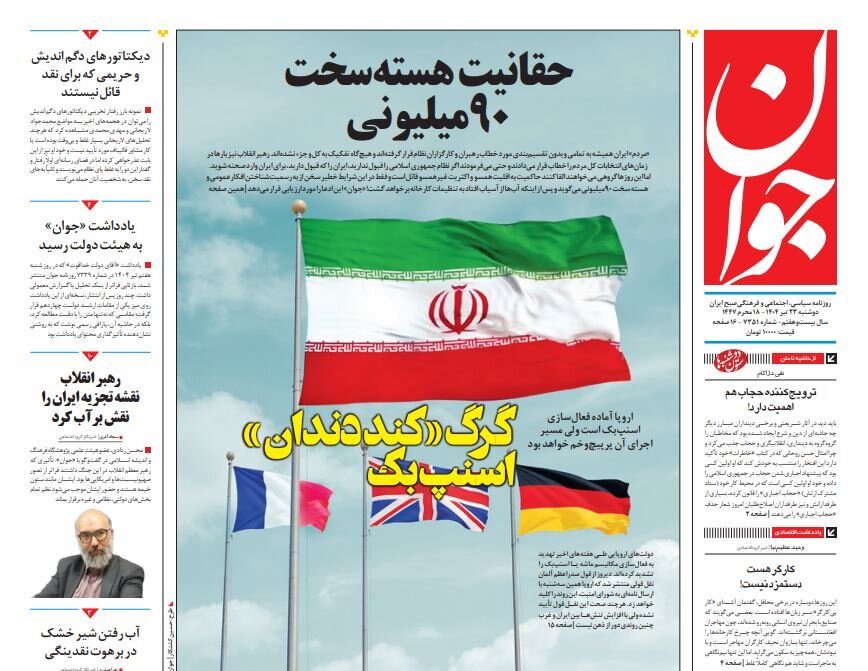The complexities of the snapback mechanism

TEHRAN - Javan discussed Europe's readiness to activate the snapback mechanism in an article.
It wrote: European governments have intensified their threats to activate the snapback mechanism in recent weeks. On Saturday, a quote was published from the German Chancellor that Europe will trigger the mechanism by sending a letter to the Security Council on Tuesday. Although the authenticity of this quote has not been confirmed, such a process is not out of the question with the increasing tensions between Iran and the West. While Iranian Foreign Minister Abbas Araghchi has warned that the implementation of the snapback mechanism "will mark the end of Europe's role" and bring about complications that the Europeans will probably not be able to overcome easily or quickly. The snapback path seems simple on paper, but its practical implementation faces major challenges. On a larger scale, the activation of the snapback mechanism could escalate the confrontation in the Security Council. The Security Council will become a geopolitical arena, rather than a place crisis management. Catherine Smith of the Brookings Institution believes that “Europe is trying to use the snapback as a pressure tool to bring Iran back to the negotiating table, not simply to restore past sanctions.”
Khorasan: An unstable America presents a reduced threat
In an analysis, Khorasan discussed economic instability in the U.S. and the future situation of Iran. It wrote: We will probably enter a period of renewed economic instability in the U.S. and the entire world. The more instability, the less likely an attack. Therefore, it is possible that in the coming days or even weeks, the U.S. will tone down its language towards Iran because the U.S. needs to control the tension in the Middle East. The approach toward a possible resumption of negotiations is also important. The other side will not sit for negotiations. Rather it will seek to impose its will. In the meantime, the core of the issue for us should be strategic negotiations with powerful countries other than the U.S., changing the idea of "weak Iran" to "strong Iran with offensive capabilities" in the minds of Trump and the larger West, and also dealing a strategic blow to the regime. It is wrong to view negotiations positively, especially in a situation where the enemy is not fundamentally looking for negotiations. The issue is military-security related, economic, political, ideological, and technological. Carefully assessing this complexity is our need today.
Resalat: The decisive role of diplomacy
In a commentary, Resalat addressed the very important role of diplomacy after the 12-day war between Iran and Israel and said: In the recent twelve days of imposed war, the authority and capability of the armed forces of the Islamic Republic of Iran under the command of the wise Leader of the revolution created a surprise and brought the evil regime of Israel to its knees - despite the military participation of the United States and the political support from Europe. Now is the time for the country's diplomats, relying on faith, wise Leadership, resilient nation, and proud armed forces, to enter the field of diplomacy and bring the enemy to his knees in this arena. To win in diplomacy, there are essential strategies that must always be insisted on, including emphasizing Iran's natural right to benefit from peaceful nuclear knowledge and technology, suspending cooperation with the International Atomic Energy Agency until it proves its neutrality, threatening to withdraw from the NPT if discrimination continues and Israel does not join the NPT, and if negotiations are necessary, requiring UN supervision and the presence of non-nuclear weapon and neutral countries. Without a doubt, if diplomats do not speak firmly and show weakness, the achievements on the battlefield will be harmed.
Etemad: Russia’s role in managing tensions between Tehran and Washington
Etemad examined Russia’s role in managing the current tensions between Tehran and Washington in an interview with Abdolreza Farajirad, a professor of geopolitics. He said: It seems that Russia has a more prominent role in this regard than the time when the JCPOA was concluded. Although Trump and Putin have held talks on this issue, it is not yet clear whether Iran has held simultaneous consultations with Russia on this issue. In any case, Russia is considered an important intermediary in this process, and the West may also accept the active role of the Russians. In this situation, if Iran can prove that its 400 kilograms of enriched uranium still exists and that the bombings have not destroyed it, this can help the negotiation process. In that situation, Tehran will probably prefer to deliver this enriched uranium to Western countries rather than to Russia. Of course, this process is conditional on the guarantees that Iran would receive in return to ensure that the security and national interests of our country will be preserved.
Leave a Comment